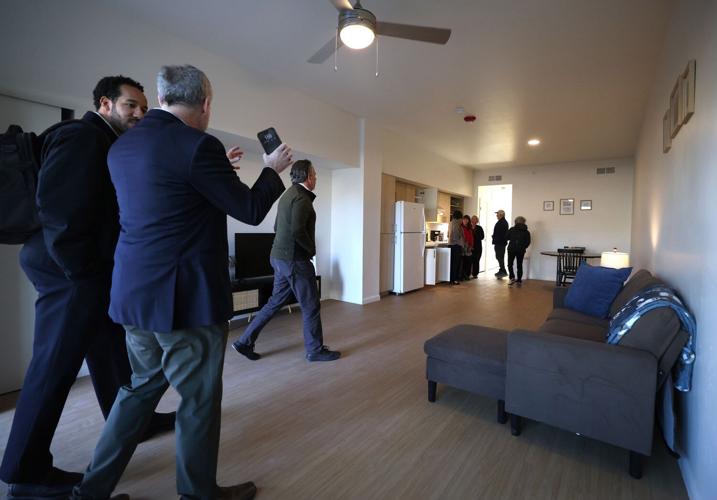A development on the site of the former No-Tel Motel opened Thursday with 63 units of affordable housing.
“Each unit here represents a commitment to change lives for the better for the people who live here,” Tucson Mayor Regina Romero, told a crowd gathered Thursday afternoon in the courtyard of Milagro on Oracle, just north of West Grant Road on the city’s north side.
The project is the first of nine housing developments planned with the city’s non-profit, El Pueblo Housing Development. Resident applications opened in December for residents 55 years and above.
The development is focusing on an older population similar to Tucson House rehabilitation and the Choice Neighborhood Project, according to Sarah Meggison, manager of housing development for the city of Tucson.
“The Tucson House is primarily older adults,” Meggison said. “And this project was sort of taking into consideration that we have quite a few Tucson House residents who are going to be moving into Milagro on Oracle.”
Fifty-one units in Milagro have been leased by those who submitted applications earlier. A waitlist will be created once all the units are filled.

Tucson Mayor Regina Romero dances with City Councilman Kevin Dahl at the opening ceremony of Milagro on Oracle, 2445 N. Oracle Road. Milagro is providing 63 units of low-income housing.
One future resident is Gerhard Shake, a veteran who has lived in Tucson since 1974. After about a year of living in transitional housing at St. Francis Shelter, he was connected to Milagro.
“There is brand new stuff throughout it,” Shake said. “I don’t have to buy nothing.”
Meggison said residents will start to move in this month, but for Shake the timing of the move is still uncertain.
“I don’t know when I’m moving in, they haven’t told me,” Shake said.
The primary funding for the affordable housing was through the federal Low-Income Housing Tax Credit. In her State of the City speech earlier this week, Romero said Tucson received approximately $18.1 million in tax credits to cover the $20 million Milagro project, in addition to other federal and private funding.
LIHTC works as an offset to tax costs to housing developers. Although other Tucson developers have used LIHTC, this is the first time in about 10 years that the city has used it to fund a project.

Guests check out one of three different housing units available to rent at Milagro on Oracle, a new low-income project that officially opened Thursday.
As part of tax-credit program, the affordable housing must charge rent no greater than 30% of the renter’s annual income. The housing is supporting individuals with incomes at or below 60% of the area median income, about $37,500 for Pima County.
Nineteen of the units at Milagro are intended for unsheltered people, or those with extremely low income. According to the U.S. Department of Housing and Urban Development, the income limit for extremely low household incomes is about $18,800.
Meggison said the next affordable housing project with El Pueblo Housing Development will be Sugar Hill on Stone, also funded by recent LIHTC awards. She said they plan to start the project in early spring.





